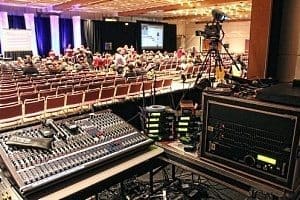
There are many challenges to face with every event, but one that is probably the most common — and the most insidious — is audio issues. Without question, the biggest problem I face as a presenter is dealing with the unique audio issues of each venue.
Larger events will have a dedicated audio engineer, but for many events the planner is stuck with the “house” sound system or perhaps is bringing his or her own portable system to a company conference room. In either case, things can go horribly awry. It’s not that anyone is being unprofessional, it’s just that audio is intrinsically hard. I've learned to simply expect audio disaster, as that gives one the best chance of avoiding it. There are many varieties of audio disaster, so we shall break them down to: batteries, feedback, wires, clips, hot mics, and “potpourri.”
Batteries
Unless there's a dedicated engineer looking after them, wireless microphones are more than 60% likely to have nearly dead batteries in them, which will only become apparent two minutes after the presentation starts. Even if you put new batteries in, you'll still have a 30% likelihood of them dying on you in the middle of the show. Don’t ask me why. I always assume my mic will die, so I always ask to have a second one handy, if it exists.
Feedback
Every venue is unique in terms of its acoustics and audio setup, but in most there are loudspeakers somewhere near or on the stage. Walking in front of a loudspeaker causes that nasty sound of “feedback,” as the sound from the loudspeaker is looping (feeding) back into the mic and out the loudspeaker. As part of my “sound check,” I will make a point of walking all around to see where the feedback spots are.
Wires
Many companies have a portable audio setup, which is usually a handheld or lavalier wireless mic, an amp, and two speakers. Invariably, the AC outlet is not where the amp needs to go, and so the power cord gets stretched to its limit. This creates danger of people tripping, or maybe the whole unit getting unplugged, and it just looks unprofessional. This problem can be mitigated by carrying one or two extra extension cords in your grip bag.
Clips
Lavalier mics generally clip on, and it’s amazing how troublesome those little clips can be. For one thing, sometimes they fall off and disappear, and now there's no way to attach the mic to your lapel. Then some of them have razor-sharp alligator teeth, just dying to munch a hole in my lapel. Such emergency issues can usually be fixed with judicious use of gaffer’s tape, another must-have for a grip bag.
Hot Mics
Wireless Lav mics are wonderful, BUT . . . it's important to remember that when you are wearing one every sound you make is sent to the loudspeakers. I once read a story on LinkedIn about a presenter who took a brief bathroom break, but she forgot to turn off her wireless mic. With no engineer monitoring levels, every sound she made in “the facilities” was broadcast to the entire meeting. We all want to make a memorable presentation, BUT . . .
And finally,
Potpourri
Murphy’s Law applies to audio in a major way. For example, one night, as I was being introduced, I was standing offstage and I hit the “on” button of the wireless mke I was wearing. I didn’t know I was right in front of a speaker, and the feedback this created was deafening.
At another event I did a complete and careful sound check, but the presenter who came on before me was having issues with his mic. In trying to fix them, he had turned off my mic’s input channel. When I walked on stage, I flipped my mic switch on, and . . . nothing. Since I'm constantly expecting audio disaster, this didn’t throw me at all. I always assume there is a 50% chance of audio failure, so out of habit I had already grabbed the previous presenter’s handheld mic as a precaution.
Part of being a professional is knowing that anything can go wrong at any time, and being ready for it before it happens. I am always prepared for an audio disaster.
Photo by Di Bédard









![How Important Are Face to Face Meetings [INFOGRAPHIC]](https://eventstant.com/wp-content/uploads/faceToface_v11-sm-218x150.jpg)
















